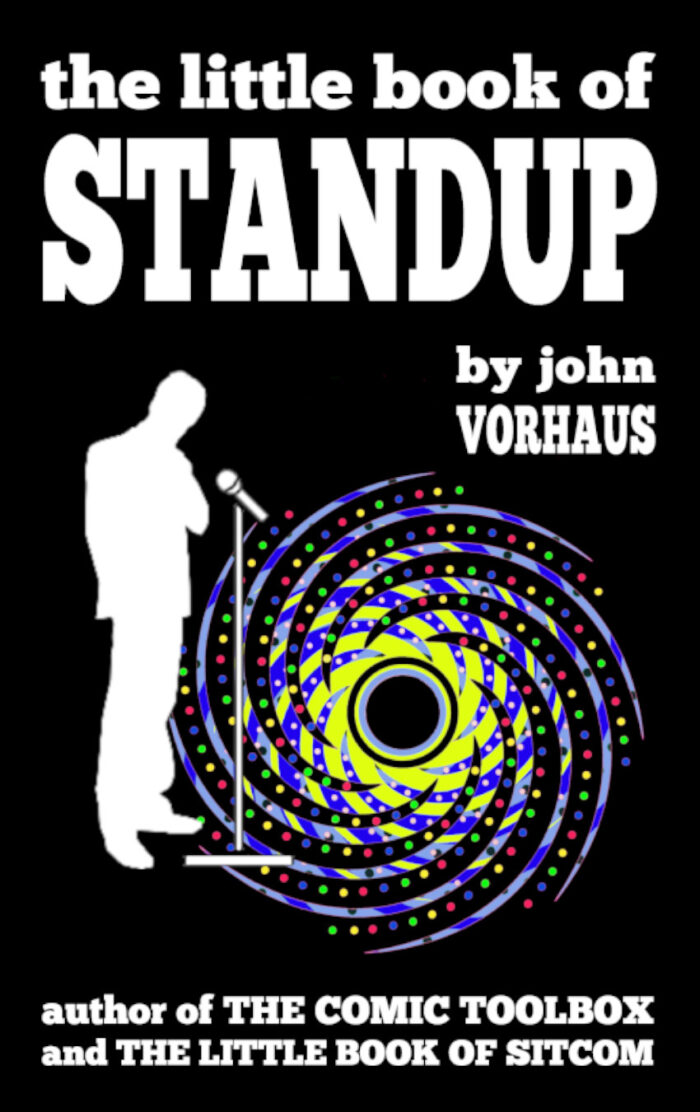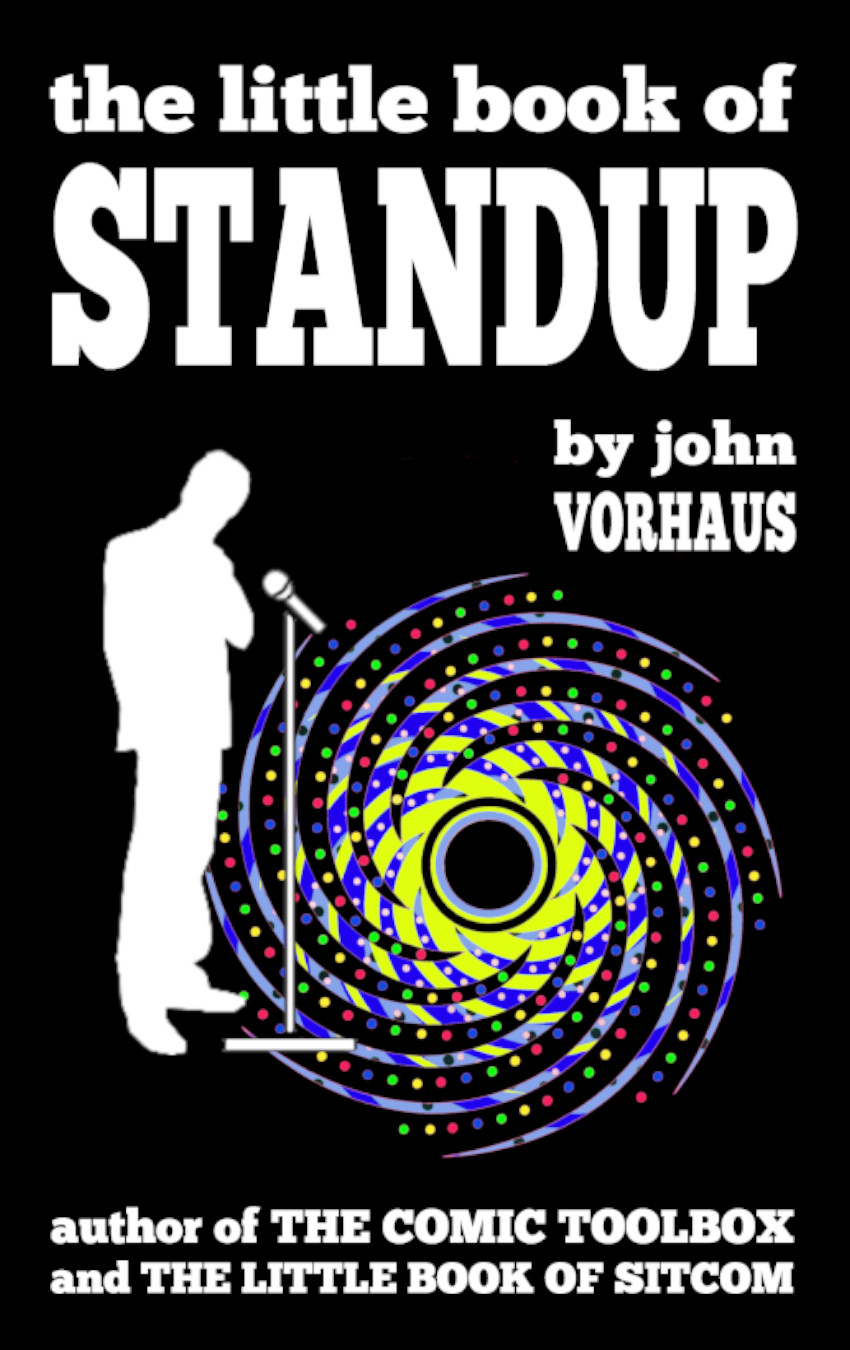Description
LEVEL UP YOUR STANDUP
Is standup comedy an itch you like to scratch? Is it something you’d like to do better, and more, with more joy and less fear? Then boy do I have a book for you.
Hi there, JV here, author of THE LITTLE BOOK OF STANDUP, which I hope you’ll be visiting soon. When you do, you’re going to learn a little about me, a lot about you, and all about what “having a practice of standup” really means. You will receive tools, inspiration, and a light dusting of awareness. If all goes according to plan, you’ll end up more comfortable in your craft and certain in the knowledge that writing and delivering great standup material is something you can do easily and well.
You’ll learn how to find your standup voice, use comic filters, build solid bits with narrative drive, and just a whole host of other ways to process your insights and observations into jokes that work — actually get a laugh — when you tell them.
You’ll also learn not to fear bad outcomes, and that’s big, just huge, because then if you bomb (as bomb we all must from time to time) you’ll understand that it’s not the end of the world — it’s not even the end of the week.
Try it! Buy it! You must be 100 percent satisfied or your money cheerfully retained!
CHAPTER ONE: A WHITE BELT IN STANDUP
A few years back, I took up art for the first time. Right from the start I knew I was gonna kinda suck. I mean, how could I not? I was doing something I’d never done before. To protect myself from self-consciousness, I decided to go for “a white belt in art,” because the white belt is the one they give you for just showing up. I figured that was something I could easily do: just show up.
What I had done, of course, was to set my expectations nice and low, and easy to exceed. This got me where I wanted to go, over the hump of my own insecurity and into an active practice of art.
That was and is a good approach and I bet it can work for standup comedy, too. I bet if you set your expectations nice and low, and then exceed them, you’ll find yourself over whatever insecurities you may have, and deeper into the great game of making people laugh.
You say you don’t have insecurities?
Don’t make me laugh.
You have them. I have them. We all have them. But we can all overcome them by setting a low bar – even one as low as “just show up.” Why? Because lower expectations equal less pressure, and when pressure is reduced, it’s easier to perform better in every sense: writing, editing, booking, promotion and of course actually doing your thing onstage.
So that answers one question right away.
How can I get better at my practice of standup?
Just lower expectations.
But this raises another question: Where am I in my practice right now? You’ve got to be somewhere, right? I mean, otherwise why are you reading this book?
Maybe you’re on the verge of your practice: You haven’t done standup yet, but you want to and you’re finding your way in.
Maybe you’ve acquired some seasoning already. Maybe you’ve performed enough times that the mere thought of taking the stage doesn’t make you want to barf into your backpack.
Maybe you’ve been at it a long time and you’re a pro – actually getting paid for your sets. If that’s you, that’s great. You’re much farther along in your practice than you were when you first started out.
Wherever you are in your practice, I’m going to try my best to help you advance.
If you’re just starting out, I want to help you get your feet wet.
If you’re growing in your craft, I want to help you grow faster.
If you’re a veteran, I want to help you make the most of what’s already working for you.
And if you’re for sure not a standup comic – someone who thinks, “You know, standup isn’t really for me but I wouldn’t mind reading a book on the subject” – well maybe I can trick you into having a practice, too. Because I know you want to. I just know you do.
Anyway, no matter where you are in your practice, here are the things I’m going to try to provide:
- Tools
- Inspiration
- Awareness
The tools will help you write more jokes and better jokes, and give you useful insight into what parts of your comedy work for you and why. This may also help reduce insecurity just by equipping you with new approaches that yield good results.
The inspiration will come – well, I hope it will come – from the knowledge that your standup comedy contains a tremendous amount of personal power: power to make people laugh; power to make them think; power to change the world.
And awareness? I’ve always thought of awareness as “the one thing that fixes everything.” Can it be otherwise? The better you know and understand yourself and everyone around you, the better you’re going to do at anything, including standup.
Not that all of this doesn’t require some leaps of faith on your part.
If I present you with new tools, you’re going to have to convince yourself that tool-driven creativity is better than magic creativity, or at least a worthy partner to it.
If I seek to inspire you to embrace the power in your work, you’re going to have to persuade yourself that such power exists, that you can have it, and that you are entitled to use it.
And if I say to you that awareness is the one thing that fixes everything – so touchy-feely, so California – you might have to fight the urge to laugh me right out of my own book.
Fortunately, there’s a way to make these leaps of faith that doesn’t require any real work on anyone’s part. Just tell yourself that the thing that you want to be true is true. This is called a useful fiction and it works like this: A guy comes along (this guy here) and says to you, “Hey, these tools and strategies and ideas of mine are going to help you be a better standup comic.” You don’t believe believe, but you play along anyhow, because at least a part of you wants to give these tricks a try. And with that you’ve shifted your thinking from this can’t possibly work to hey, maybe it will.
That’s a big win right there. That gets you out of a negative mindset and into a positive one. And how did you get there? You told yourself a lie… admitted it was a lie… but told it anyhow, for the sake of the benefit you hope it will bring.
Probably this is a strategy you already use. Maybe you use it to find the courage to go up on a new and scary stage. Or maybe to write something bigger and more challenging than you’ve written before. Or steel yourself to approach a booker who you just know is going to tell you no. Any time you invest hope in anything, you’re invoking a useful fiction. You don’t know it’s going to work out, but you hope it will work out, and telling yourself that it will work out puts you halfway into the place where it can work out.
That’s a lot to take on, I know. Pretty heady stuff, and I don’t expect it to make sense all at once. So let’s just put it this way: What have you got to lose? Only the cost of this book, and that’s not much. Plus your time, of course. You don’t want to be seen wasting your time, and I get that. But I put it to you that if you work with the ideas in this book and get no fricking improvement whatsoever, you’ll still be ahead of the game because you will have spent a certain amount of time trying to get better – and spending time trying to get better is exactly, one hundred percent, the way to get better all the time.
RECAP
- Lowering expectations improves performance
- Awareness is the one thing that fixes everything
- A useful fiction is a fiction, but it’s useful just the same
